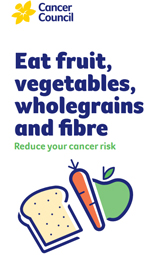- Home
- Cancer Prevention
- Diet and exercise
- Food and nutrition
- Fruit and vegetables
Fruit and vegetables and cancer risk
Fruits and vegetables are important for health and should form a major part of your daily diet. They are a great source of fibre, vitamins and minerals. Fibre is known to protect against bowel cancer.
Fruit and vegetables also contain natural substances, such as antioxidants, that have cancer-protective effects. Fruit and vegetables may protect against cancer of the bowel, mouth, throat and stomach. Fruit may also protect against lung cancer.
However fruit and vegetables are probably most useful in helping to maintain a healthy body weight. This is because fruit and vegetables are low in energy (kilojoules or calories) and high in fibre, which helps us to feel fuller and may help us eat less. Overweight and obesity is a risk factor for 13 types of cancer, including cancer of the bowel, oesophagus, kidney, liver, pancreas, endometrium, and breast (after menopause).
How much fruit and vegetables should you eat?
At least five serves of vegetables and two serves of fruit a day are recommended for good health and to reduce cancer risk.
A serve of vegetables or legumes
- ½ cup cooked vegetables
- 1 cup of salad or raw vegetables
- ½ cup legumes e.g. soy beans, lentils, chickpeas, kidney beans
- ½ medium potato, with the skin on
A serve of fruit
- 1 medium sized piece of fruit e.g. apple, pear, orange, banana
- 2 small pieces of fruit e.g. apricots, plums, kiwifruit
- 1 cup fruit salad or canned fruit pieces (no added sugar)
- 1 ½ tablespoons of sultanas or other dried fruit (occasionally)
- ½ cup (125mL) of unsweetened juice (occasionally)
How to eat more fruit and vegetables daily
- Shop for seasonal fruit and vegetables weekly to ensure you have a fresh supply.
- Add fresh or canned fruit (no added sugar) as a topping on breakfast cereal.
- Have a serve of veg at breakfast such as mushrooms, tomato, avocado or baked beans (reduced salt) on wholegrain toast
- Include salad with lunch or choose dishes which include plenty of vegetables.
- Fill your lunch time sandwich, wrap or rolls with vegetables.
- Fill half your dinner plate with vegetables.
- Adapt your recipes to include more vegetables, (e.g. add carrot, celery and zucchini to bolognaise sauce).
- Include at least three different coloured vegetables with your main meal.
- For interest and variety, cook vegetables in different ways e.g. steamed, oven roasted, grilled or barbequed.
- Enjoy fruit as a snack or for dessert.
- Munch on some vegie sticks and dip as a snack.
- Use frozen, dried or canned (no added salt) vegetables and fruit if fresh is not available.
- Have a meat-free meal at least once a week. Try a vegetable-based pasta, risotto, frittata, soup or curry.
For more recipes and ideas visit healthymadetasty.com.au
Different types of fruit and vegetables contain different nutrients that protect in different ways, so it’s best to eat a variety of colours including red, green, yellow, white, purple and orange.
Consumption of both cooked and raw vegetables is recommended.
Organic fruit and vegetables do not appear to protect against cancer more than conventionally grown fruit and vegetables. The consumption of organic fruit and vegetables is an individual choice.
Nutritional supplements
Scientists are still discovering the many beneficial protective substances found in vegetables and fruit, and a tablet cannot possibly replace the real thing. Be careful taking vitamins as some are toxic in large doses. It is best to obtain vitamins and minerals naturally by eating a balanced diet that includes at least five serves of vegetables and two serves of fruit daily.
Featured Resource

Eat fruit, vegetables, wholegrains and fibre
Learn how to reduce your cancer risk by eating fruit, vegetables, wholegrains and fibre.
Download PDF298kB